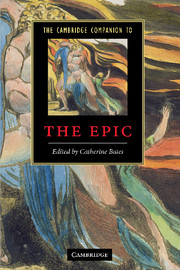Book contents
- Frontmatter
- 1 The Epic of Gilgamesh
- 2 Greek epic
- 3 Roman epic
- 4 Heroic epic poetry in the Middle Ages
- 5 Dante and the epic of transcendence
- 6 Italian Renaissance epic
- 7 Camões’s Os Lusíadas: the first modern epic
- 8 The Faerie Queene: Britain’s national monument
- 9 The seventeenth-century Protestant English epic
- 10 Mock-heroic and English poetry
- 11 Romantic re-appropriations of the epic
- 12 Ezra Pound, T.S. Eliot, and the modern epic
- 13 Derek Walcott’s Omeros
- 14 Epic in translation
- Guide to further reading
- Index
5 - Dante and the epic of transcendence
Published online by Cambridge University Press: 28 May 2010
- Frontmatter
- 1 The Epic of Gilgamesh
- 2 Greek epic
- 3 Roman epic
- 4 Heroic epic poetry in the Middle Ages
- 5 Dante and the epic of transcendence
- 6 Italian Renaissance epic
- 7 Camões’s Os Lusíadas: the first modern epic
- 8 The Faerie Queene: Britain’s national monument
- 9 The seventeenth-century Protestant English epic
- 10 Mock-heroic and English poetry
- 11 Romantic re-appropriations of the epic
- 12 Ezra Pound, T.S. Eliot, and the modern epic
- 13 Derek Walcott’s Omeros
- 14 Epic in translation
- Guide to further reading
- Index
Summary
In a famous essay of 1920 entitled The Theory of the Novel, Georg Lukács drew a sharp distinction between ancient epic and the modern novel. The genres both sought to represent concrete reality, he maintained, but their perceptions of it were very different. The world of the epic was experienced as homogeneous, a totality of which the hero was part, while in the novel, the world was experienced as fragmentary and, with respect to subjectivity, radically 'other'. The 'blissful' world of Homeric epic was integrated and closed, bounded by the starry heaven, within which gods and humans felt equally at home, even as they struggled among themselves. The heroes of the epic lived through harrowing external adventures, but their inward security was such that their essence could never be seriously threatened. In the eternal world of the epic, the hero 'was the luminous centre', the passive, immobile point around which reality moved. In contrast, the novel - the predominant genre of modernity - recounts an interior adventure in which the solitary hero is alienated from a world that is no longer hospitable. He yearns for integration, but finds it perpetually out of the reach of his desire. The gods have grown silent and the 'world of action loses contact with that of the self, leaving man empty and powerless, unable to grasp the real meaning of his deeds'. The hero of the novel is alone; an unbridgeable gap separates him from all others in a universe vastly expanded and no longer intelligible. The novel represents the 'epic of a world from which God has departed'.
- Type
- Chapter
- Information
- The Cambridge Companion to the Epic , pp. 76 - 92Publisher: Cambridge University PressPrint publication year: 2010

